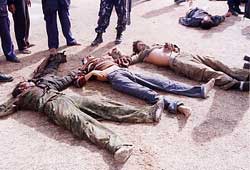 What can we say that we haven't said before? And is there any point repeating it? All we can do is pray and mourn for the recent dead, the 3,200 killed in the past six years, the thousands upon thousands of Nepalis who have been bereaved. We mourn for a nation in mourning.
What can we say that we haven't said before? And is there any point repeating it? All we can do is pray and mourn for the recent dead, the 3,200 killed in the past six years, the thousands upon thousands of Nepalis who have been bereaved. We mourn for a nation in mourning. The political decay that led us down this slippery slope was in full display in parliament this week as we prepared to mark the dawn of democracy 50 years ago. It was hard to stomach the sight of the people's representatives tearing at each other, yanking microphones, and gheraoing the podium-even before the bodies in the ruins of the barracks and police posts of Achham had stopped smouldering.
It is hard to take this feigned outrage seriously when overturning the podium becomes the ultimate expression of political anger in our fledgling democracy. Our opposition MPs have a problem with calibrating protest: an airliner leasing scam and the biggest debacle in the nation's history elicit the same level of rage. And either way, it is the furniture in the House of Representatives that bears the brunt.
And about the ruling party, the less said the better. Nepalis are thoroughly sick of these plutocrats and their back-room intrigue, the callous immorality, and a fatal ignorance of statecraft. Their petty games and narrow minds has brought this crisis upon us. Why does the country have to pay in blood for the personality clash of these failed, venal and power-crazed individuals? How long do we have to endure them?
If a crisis of this magnitude and national peril cannot bring our politicos together, it is hard to imagine what will. There go Girija Prasad Koirala and Sher Bahadur Deuba challenging each other to a duel on the Titanic. There is Madhav Kumar Nepal playing his fiddle on the tilting deck. And everyone else is rushing madly for the lifeboats.
To be sure, democracy is supposed to thrive precisely on this partisanship, on competition between those who disagree, on the marketplace of ideas. But that is true when democracy reaches a certain maturity, stature and stability. Our fragile polity just can't take this kind of chronic abuse.
We have a situation here: democracy is threatened by an ultra- violent group that does not believe in it. Their reach has widened dramatically in the past six years, and they have used brutal violence to cleverly fill the vacuum left by the state. And as the threat to our democracy and freedoms get more and more serious, our parliamentary parties and factions within them continue to use that threat to bring each other down.
This cannot go on, because by doing that, the political parties are chopping off their own legs. Successive rulers since 1996 have squandered the political option: the civil police couldn't fight the war so an armed police force was set up, the laws of the land were not enough and the anti-terrorism act was needed, constitutional provisions did not suffice and so an emergency was declared and the army unleashed. And the problem is still there. If anything, it is getting bigger.
There is a lesson here. If this road is not taking us anywhere we must be flexible-backtrack and look at the political options we abandoned, while maintaining the military pressure on the rebels. Unfortunately, Sher Bahadur Deuba has painted himself into a corner with his no-talks stand that means he has only a stick and no carrot.
And yet, in the final analysis, there is no doubt that parliamentary parties must see a common threat much larger than each other and forge a minimum alliance on the basic things they say they agree on: non-violent struggle, democracy and social progress. It must be parliament that must provide the mechanism for this lowest common denominator to be articulated. The statesmanship, as well as a new breed of political leaders to articulate this must emerge from the 205.
That leadership exists, it's just buried underneath a pile of high-profile cynics and crooks. This new leadership must make common cause at the political level to give the people hope and the security forces a sense that they are fighting to preserve something that matters deeply for the country's future.


